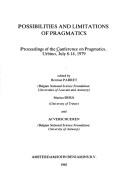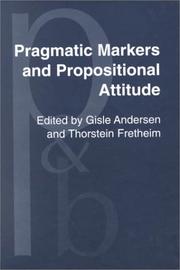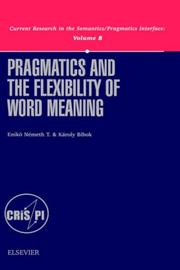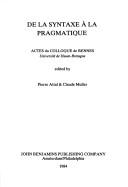| Listing 1 - 7 of 7 |
Sort by
|

ISBN: 9027230064 1283222531 9027283176 9786613222534 9789027230065 9789027283177 Year: 1981 Volume: 7 Publisher: Amsterdam: Benjamins,
Abstract | Keywords | Export | Availability | Bookmark
 Loading...
Loading...Choose an application
- Reference Manager
- EndNote
- RefWorks (Direct export to RefWorks)
This impressive volume attempts to make an assessment of past achievements, but also to open up new perspectives in the field of pragmatics, exactly ten years after the publication of Searle's seminal Speech Acts. This rich collection presents an unrivaled diversity of topics and approaches united by the possibilities and limitations generic to the field of pragmatics.
Pragmatics --- Congresses --- Congresses. --- -801.56 --- 801.56 Syntaxis. Semantiek --- Syntaxis. Semantiek --- Pragmalinguistics --- General semantics --- Language and languages --- Logic, Symbolic and mathematical --- Semantics (Philosophy) --- Philosophy --- 801.56 --- Pragmatics - Congresses

ISBN: 9027250987 1556197977 9786613174628 1283174626 9027283745 9789027250988 9789027283740 9781283174626 6613174629 9781556197970 Year: 2000 Volume: 79 Publisher: Amsterdam ; Philadelphia : J. Benjamins Pub.,
Abstract | Keywords | Export | Availability | Bookmark
 Loading...
Loading...Choose an application
- Reference Manager
- EndNote
- RefWorks (Direct export to RefWorks)
In interactive discourse we not only express propositions, but we also express different attitudes to them. That is, we communicate how our mind entertains those propositions that we express. A speaker is able to express an attitude of belief, desire, hope, doubt, fear, regret or pretence that a given proposition represents a true state of affairs. This collection of papers explores the contribution of particles and other uninflected mood-indicating function words to the expression of propositional attitude in the broad sense. Some languages employ this type of attitude-marking device extensively, even for the expression of basic moods and basic speech act categories, other languages use such markers sparsely and always in interaction with syntactic form. Both types of language are examined in this volume, which includes studies of attitudinal markers in Amharic, English, Gascon, Occitan, German, Greek, Hausa, Hungarian, Japanese, Norwegian and Swahili. The theoretical emphasis is on issues such as interpretive vs. descriptive use of utterances or utterance parts, procedural semantics, linguistic underdetermination of the proposition expressed and the speaker's communicated attitude to it, higher-level explicatures in the relevance-theoretic sense, the explicit - implicit distinction, as well as processes of grammaticalization and negotiation of propositional attitude in spoken interaction.
Pragmatics --- Proposition (Logic) --- Propositional attitudes --- General semantics --- Language and languages --- Logic, Symbolic and mathematical --- Semantics (Philosophy) --- Attitude (Psychology) --- Thought and thinking --- Philosophy --- Pragmatics - Congresses. --- Proposition (Logic) - Congresses.

ISBN: 0080439713 0585474265 9780080439716 9780585474267 Year: 2001 Volume: 8 Publisher: Leiden; Boston : BRILL,
Abstract | Keywords | Export | Availability | Bookmark
 Loading...
Loading...Choose an application
- Reference Manager
- EndNote
- RefWorks (Direct export to RefWorks)
Recently, the investigation of word meaning in utterances has connected two different fields: lexical semantics and pragmatics. A new linguistic discipline, namely lexical pragmatics, is emerging. The eleven papers of the present book constitute a unit in the sense that they have a common aim: to explore the interaction between lexical semantics and pragmatics. The authors examine phenomena such as productive sense extension, regular polysemy, multifunctionality, implicit arguments and predicates, and non-typical anaphoric pronouns, on the basis of linguistic data, for instance, from English, Norwegian, Russian, and Hungarian, as well as using a great variety of frameworks (optimality framework, two-level semantics, the theory of generative lexicon, cognitive grammar, Gricean theory, and relevance theory.
Lexicology. Semantics --- Pragmatics --- Semantics --- 801.57 --- Formal semantics --- Semasiology --- Semiology (Semantics) --- Comparative linguistics --- Information theory --- Language and languages --- Lexicology --- Meaning (Psychology) --- Pragmalinguistics --- General semantics --- Logic, Symbolic and mathematical --- Semantics (Philosophy) --- 801.57 Pragmatiek --- Pragmatiek --- Philosophy --- Pragmatics. --- Pragmatics - Congresses. --- Semantics - Congresses
Book
ISBN: 9780857242471 0857242474 9004253246 9789004253247 Year: 2010 Volume: 9 Publisher: Bingley, England : Emerald,
Abstract | Keywords | Export | Availability | Bookmark
 Loading...
Loading...Choose an application
- Reference Manager
- EndNote
- RefWorks (Direct export to RefWorks)
Hedging is an essential part of everyday communication. It is a discourse strategy which is used to reduce commitment to the force or truth of an utterance to achieve an appropriate pragmatic effect. In recent years hedges have therefore attracted increased attention in Pragmatics and Applied Linguistics, with studies approaching the concept of hedging from various perspectives, such as speech act - and politeness theory, genre-specific investigations, interactional pragmatics, and studies of vague language. The present volume provides an up-to-date overview of current research on the topic by bringing together studies from a variety of fields. The contributions span a range of different languages, investigate the use of hedges in different communicative settings and text types, and consider all levels of linguistic analysis from prosody to morphology, syntax and semantics. What unites the different studies in this volume is a corpus-based approach, in which various theoretical concepts and categories are applied to, and tested against, actual language data. This allows for patterns of use to be uncovered which have previously gone unnoticed and provides valuable insights for the adjustment and fine-tuning of existing categories. The usage-based approach of the investigations therefore offers new theoretical and descriptive perspectives on the context-dependent nature and multifunctionality of hedges.
Hedge (Linguistics) --- Euphemism --- Pragmatics --- Euphemism. --- Pragmatics. --- Pragmalinguistics --- Hedging (Linguistics) --- General semantics --- Language and languages --- Logic, Symbolic and mathematical --- Semantics (Philosophy) --- Figures of speech --- Semantics --- Linguistics --- Philosophy --- E-books --- Hedge (Linguistics) - Congresses --- Euphemism - Congresses --- Pragmatics - Congresses
Multi
ISSN: 14343452 ISBN: 9783110427561 9783110427622 9783110431759 3110431750 3110427621 3110427567 9783110427578 3110427575 3110427575 Year: 2015 Volume: 89 Publisher: Berlin, [Germany] ; Boston, [Massachusetts] : De Gruyter Mouton,
Abstract | Keywords | Export | Availability | Bookmark
 Loading...
Loading...Choose an application
- Reference Manager
- EndNote
- RefWorks (Direct export to RefWorks)
In examining the phenomenon of "ing from multiple angles, The Pragmatics of Quoting Now and Then offers a fresh view on the forms, functions and usage of "ing as a meta-communicative act in various forms of old (printed) and new (electronically mediated) communication, setting it apart from (seemingly) related acts like repeating or referring. Recent interest in the formal (copy-paste "ing) and ethical ("ing as plagiarizing) aspects of "ing has been gaining considerable momentum in linguistics (and other disciplines), predominantly fuelled by enormous technological progress and the impact on both the procedure of "ing itself and its appraisal in public discourse. Embracing a broad, interdisciplinary perspective, the authors pay special tribute to the inherent complementarity of both synchronic and diachronic perspectives. With contributions pinpointing the formal and functional evolution of "ing and tracing trends in linguistic variation, this volume brings together interpersonal pragmatics, sociolinguistics, historical, cognitive and text linguistics as well as cultural studies. In this way, the present title provides a more comprehensive and integral understanding of the nature of "ing.
E-books --- Pragmatics --- Pragmatique. --- Quotation. --- Speech acts (Linguistics) --- Grammar, Comparative and general --- Language and languages --- Sociolinguistics. --- Citation --- Pragmatique --- Actes de parole --- Interrogatif --- Variation (Linguistique) --- Sociolinguistique --- History. --- Interrogative. --- Variation --- History --- Histoire --- Comparative linguistics. --- Comparative philology --- Philology, Comparative --- Historical linguistics --- Pragmatics - Congresses --- Context. --- Evaluation. --- Multimodality. --- Quoting.
Book
ISBN: 9782847883589 2847883584 2847886265 Year: 2012 Publisher: Lyon: École normale supérieure,
Abstract | Keywords | Export | Availability | Bookmark
 Loading...
Loading...Choose an application
- Reference Manager
- EndNote
- RefWorks (Direct export to RefWorks)
La sémantique linguistique, après avoir été le parent pauvre de la linguistique, et souvent reléguée au rang d'ornement de la syntaxe, commence à se constituer en discipline autonome. La pertinence de certains concepts est largement reconnue, les méthodes s'affinent et se généralisent, des résultats surgissent et sont acceptés par tous. Cette évolution est due à plusieurs facteurs. Le premier et le plus important réside dans le choix de considérer la sémantique comme une composante autonome de la description linguistique : interdépendante certes avec d'autres composantes, mais non plus à la remorque d'une syntaxe régnant en maître absolu, et imposant sa loi, comme le voulait le modèle morrissien qui a longtemps dominé en linguistique. Par ailleurs, l'apparition en sémantique de cette partie de la pragmatique comprise dans le noyau sémantique fondamental (ce qu'on appelle la pragmatique intégrée) a réintégré les phénomènes énonciatifs dans la sémantique. Et ce, au travers de diverses théories comme les actes de langage ou les études sur le discours rapporté. Enfin, la tendance à s'éloigner du niveau de surface pour élaborer un niveau profond, en favorisant l'apparition de sémantiques de type instructionnel, permet de dépasser le niveau strict de la phrase, pour s'intéresser éventuellement à l'articulation interphrastique. On trouvera traités dans ce volume quelques grands thèmes de la sémantique contemporaine : l'organisation des relations interphrastiques par marqueurs et connecteurs, les phénomènes de discours rapporté et de polyphonie, les divers rôles mis en scène dans cette comédie qu'est la parole, et les contenus qui s'articulent autour de ces notions, comme le savoir commun lié aux doxas et dont une partie transparaît dans le fonds parémiologique.
Discourse markers --- Voice --- Pragmatics --- Marqueurs discursifs --- Énonciation (linguistique) --- Languages & Literatures --- Philology & Linguistics --- Speaking --- Human sounds --- Language and languages --- Music --- Throat --- Diaphragm --- Elocution --- Larynx --- Speech --- Discourse connectives --- Discourse particles --- Pragmatic markers --- Pragmatic particles --- Discourse analysis --- Physiological aspects --- Marqueurs discursifs. --- Discourse markers - Congresses --- Voice - Congresses --- Pragmatics - Congresses --- Énonciation (linguistique) --- General semantics --- Logic, Symbolic and mathematical --- Semantics (Philosophy) --- Philosophy --- marqueurs discursifs --- relation interphrasique --- sémantique --- discours --- polyphonie --- linguistique

ISBN: 9027231184 9786613328717 1283328712 9027280096 9789027231185 9789027280091 Year: 1984 Volume: v. 8 Publisher: Amsterdam ; Philadelphia : J. Benjamins Pub. Co.,
Abstract | Keywords | Export | Availability | Bookmark
 Loading...
Loading...Choose an application
- Reference Manager
- EndNote
- RefWorks (Direct export to RefWorks)
Les textes ici rassemblées donnent un tableau fidèle de l'état actuel et l'orientation des recherches linguistiques. Non que toutes les écoles, chapelles, églises et sectes y soient représentées: un seul volume n'y suffirait pas. Mais les principaux courants y sont, et pas seulement dans les patronages dont ils se réclament: également dans l'approche des faits, dans le type de problème soulevé, dans les solutions envisagées.
Grammar, Comparative and general --- Semantics --- Pragmatics --- Syntax --- Congresses --- Congresses. --- French language --- Grammar --- -Pragmatics --- -Semantics --- -Formal semantics --- Semasiology --- Semiology (Semantics) --- Comparative linguistics --- Information theory --- Language and languages --- Lexicology --- Meaning (Psychology) --- Pragmalinguistics --- General semantics --- Logic, Symbolic and mathematical --- Semantics (Philosophy) --- Comparative grammar --- Grammar, Philosophical --- Grammar, Universal --- Philosophical grammar --- Linguistics --- Philology --- -Congresses --- Philosophy --- Grammar, Comparative --- Syntaxe --- Sémantique --- Pragmatique --- Congrès --- Sémantique --- Syntax&delete& --- Grammar, Comparative and general - Syntax - Congresses --- Semantics - Congresses --- Pragmatics - Congresses
| Listing 1 - 7 of 7 |
Sort by
|

 Search
Search Feedback
Feedback About UniCat
About UniCat  Help
Help News
News